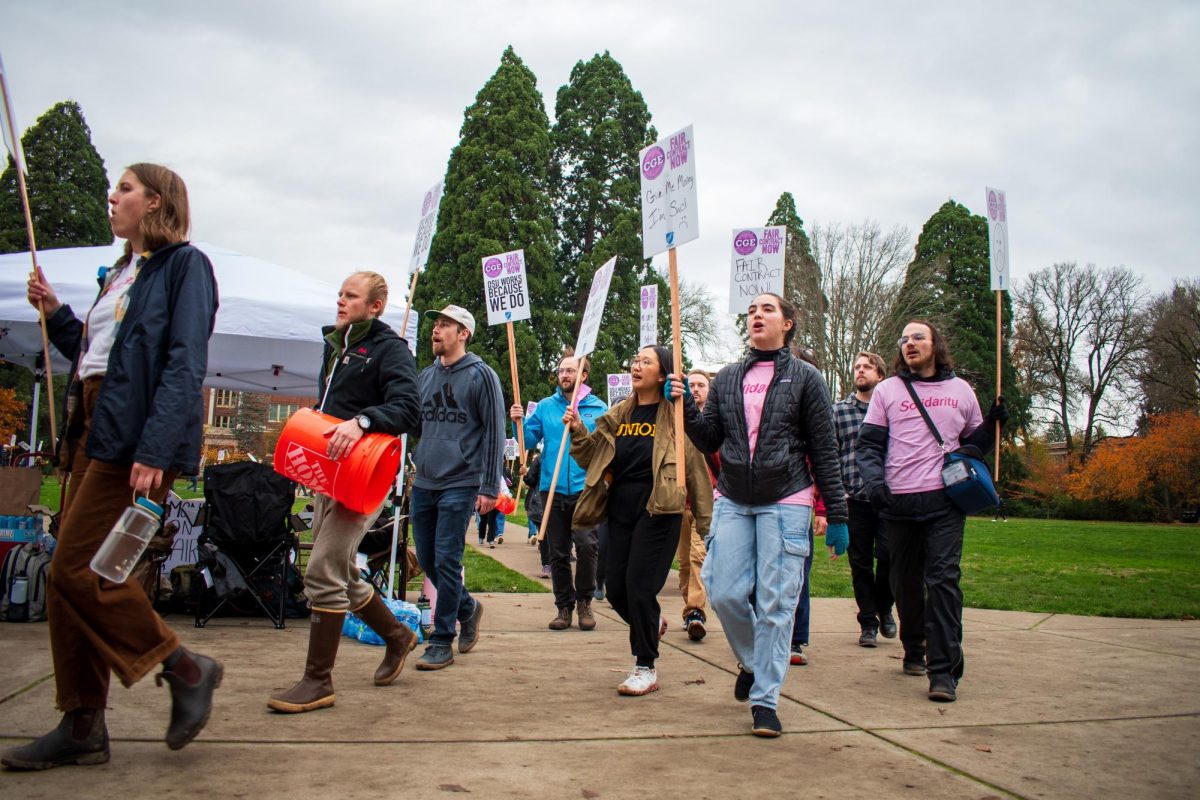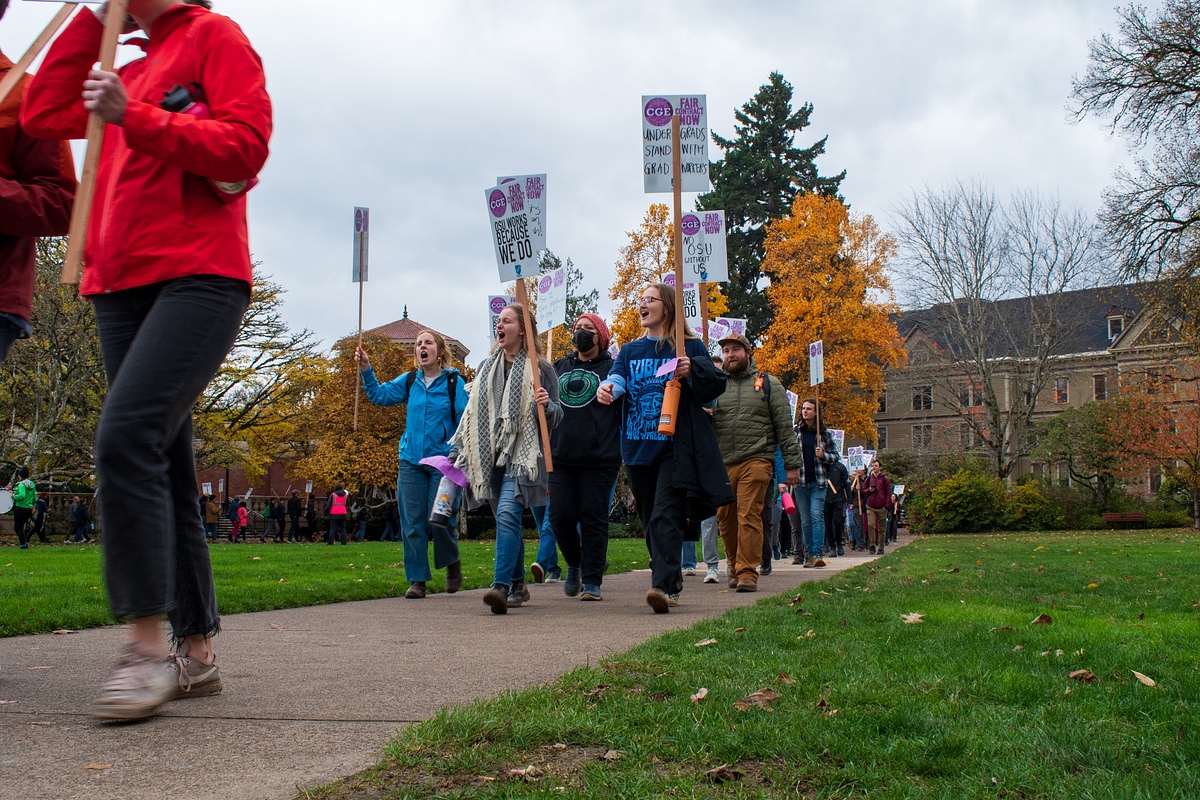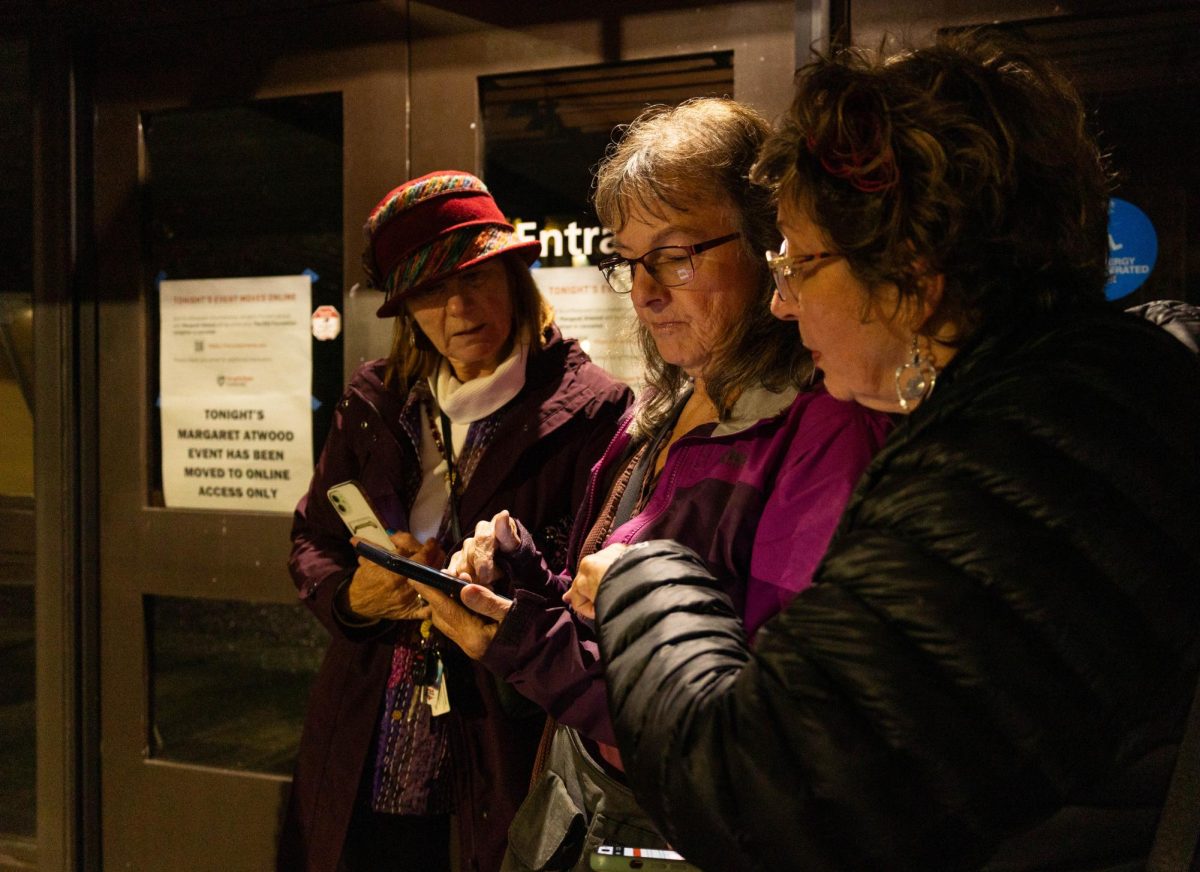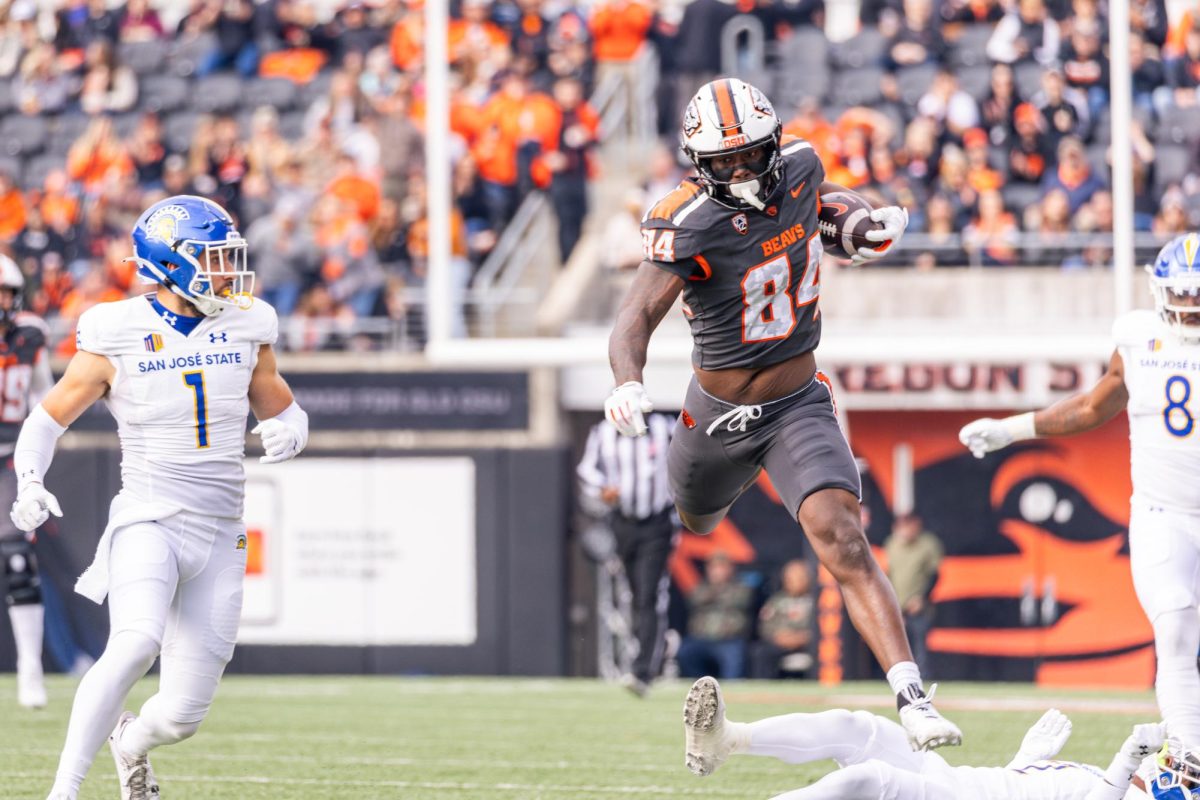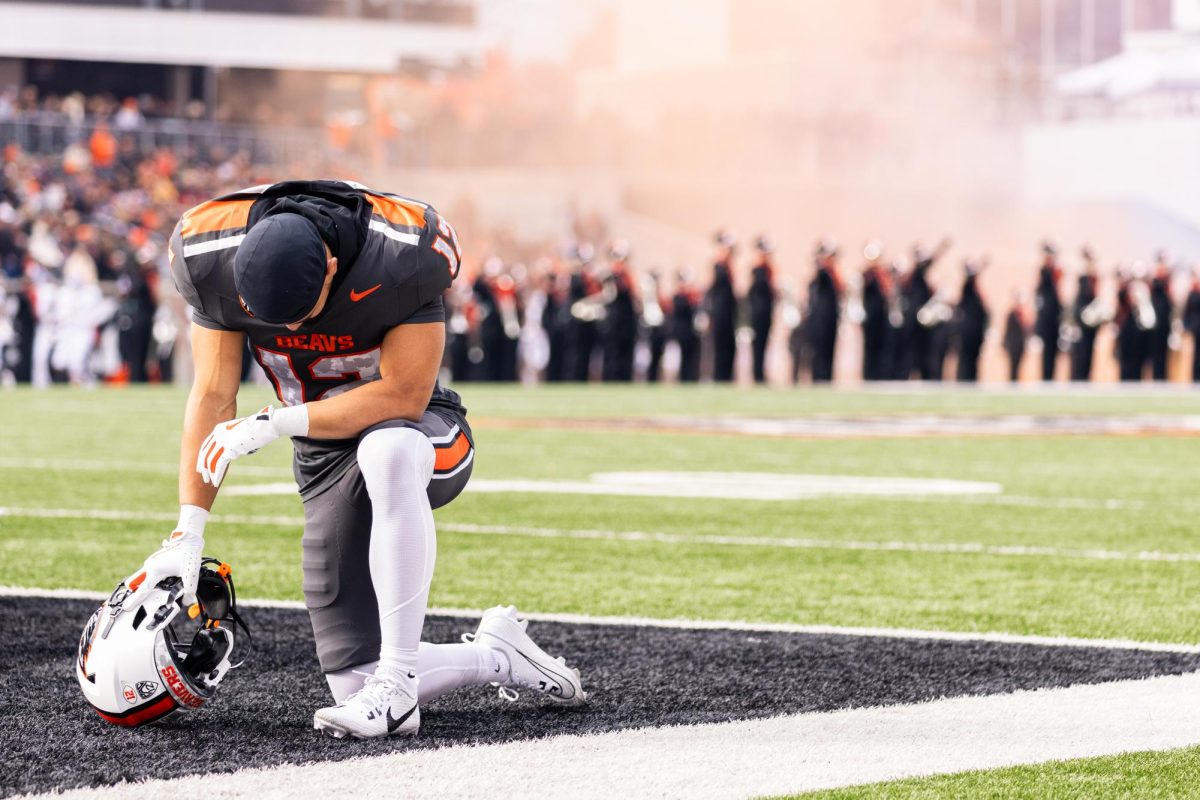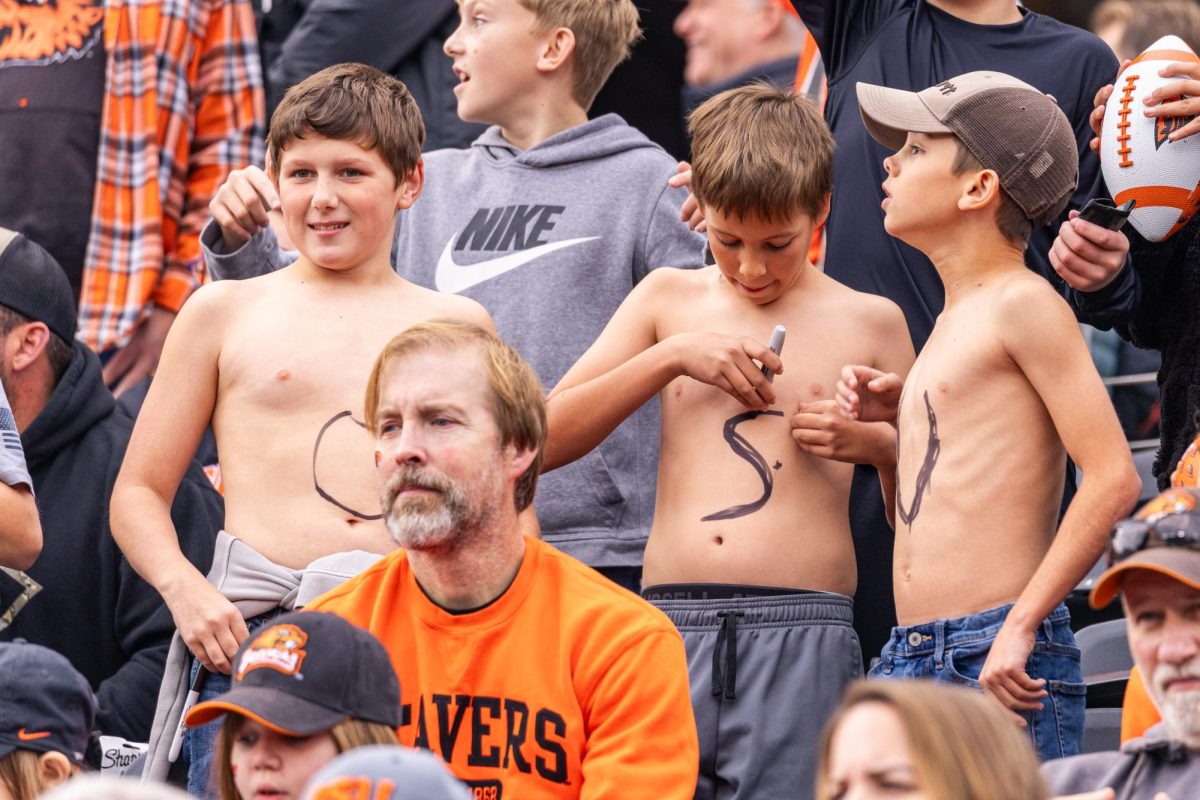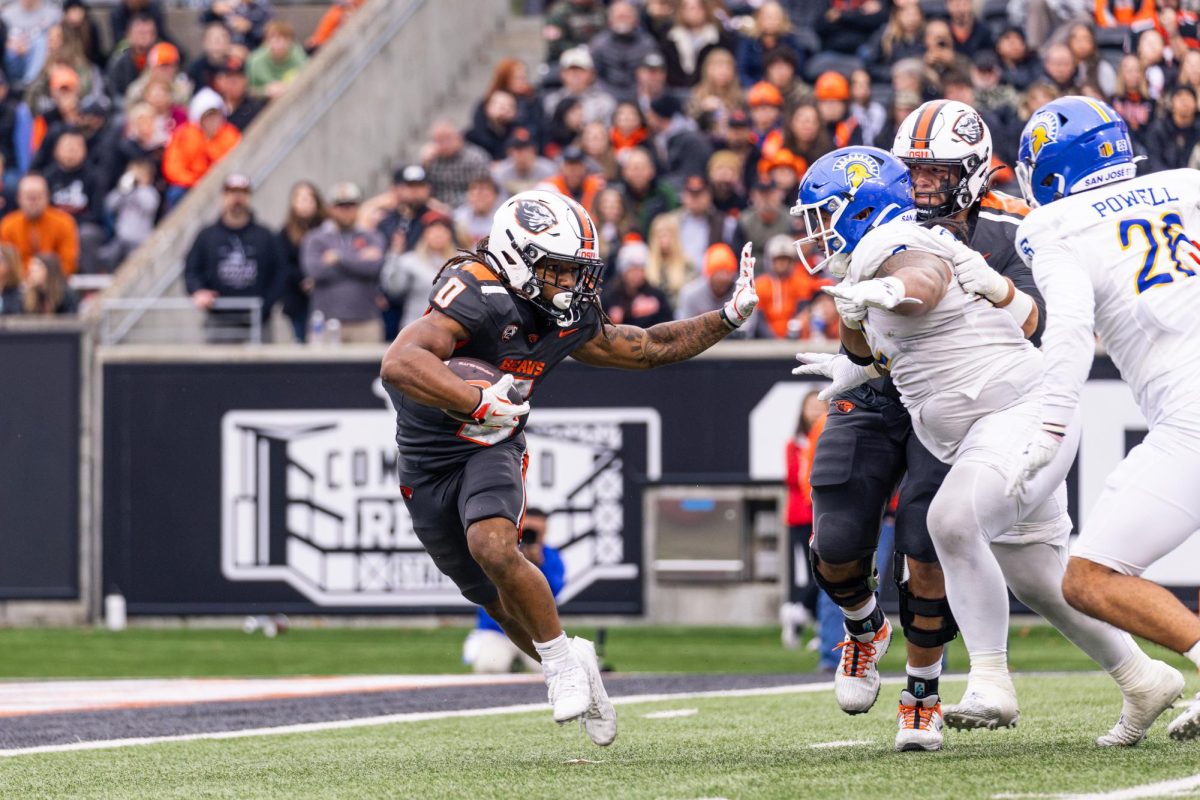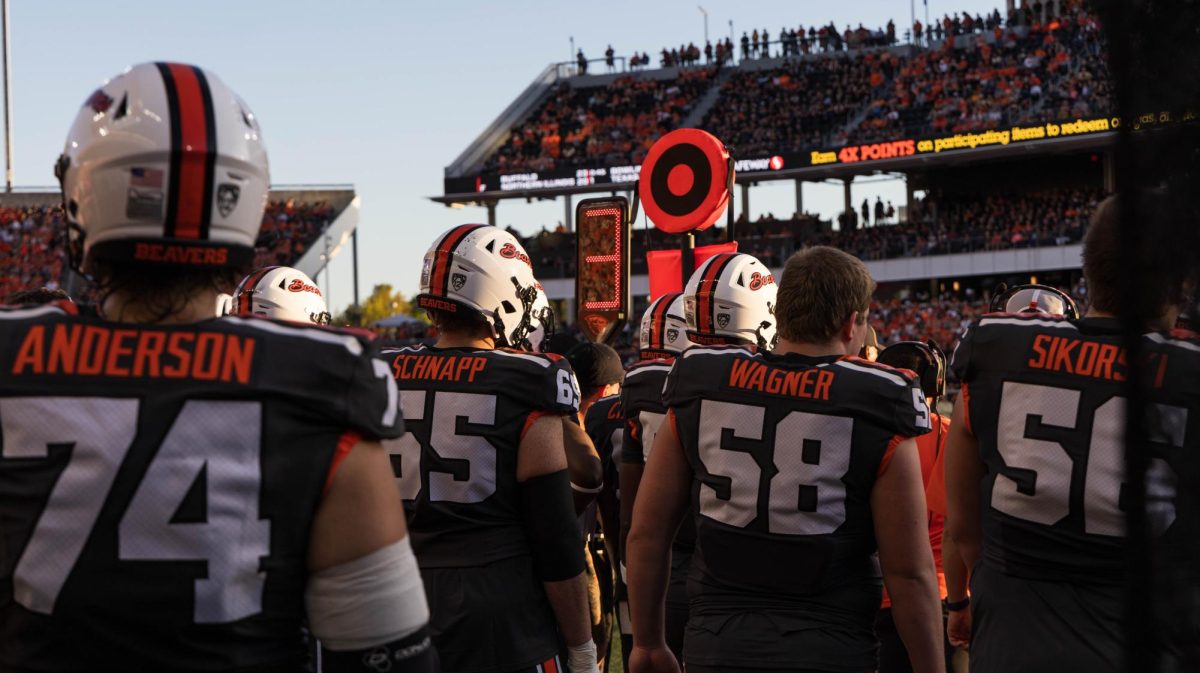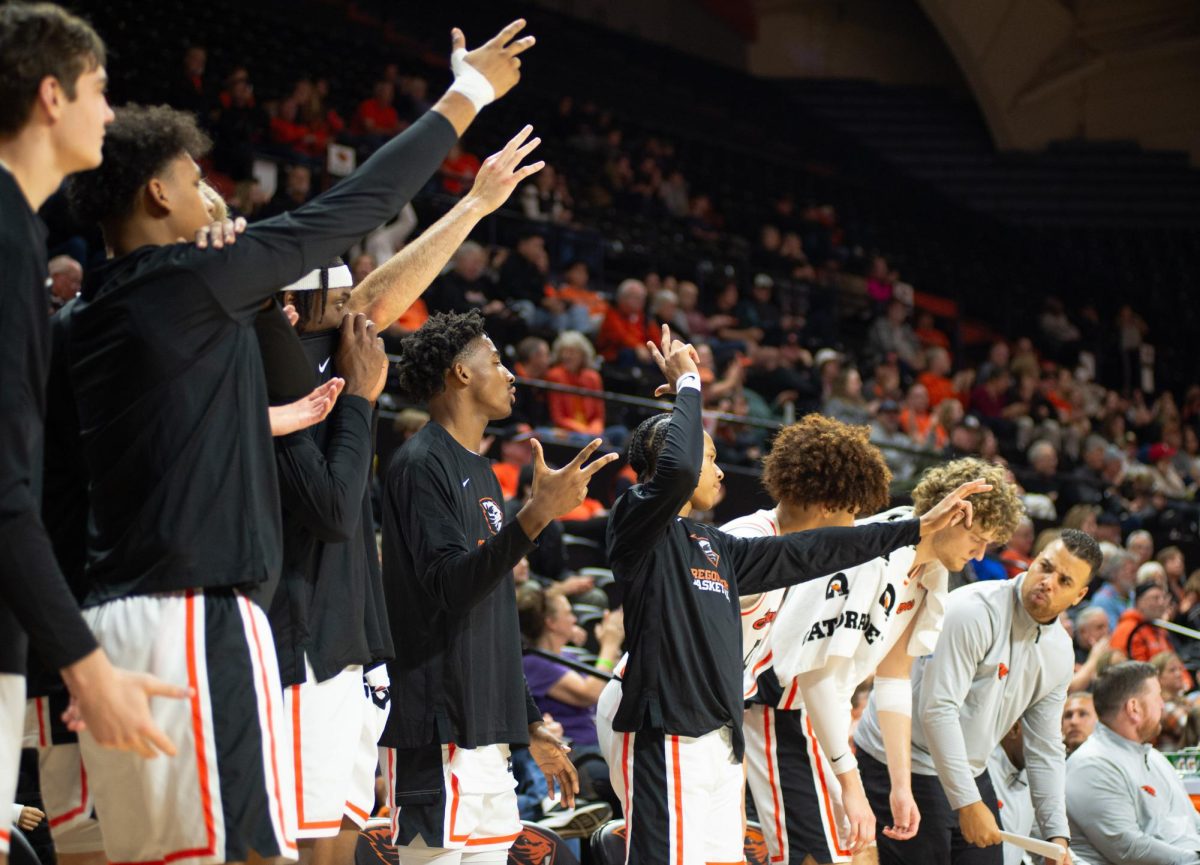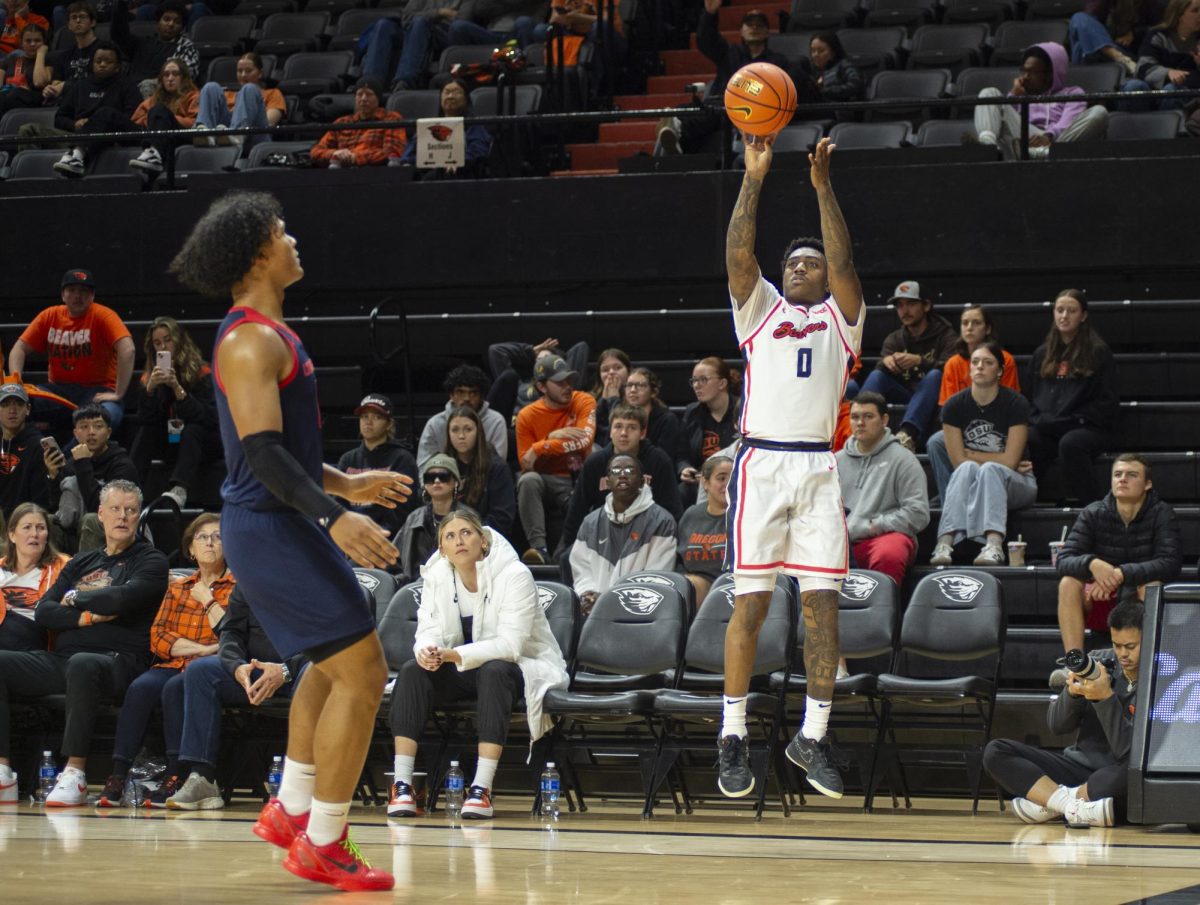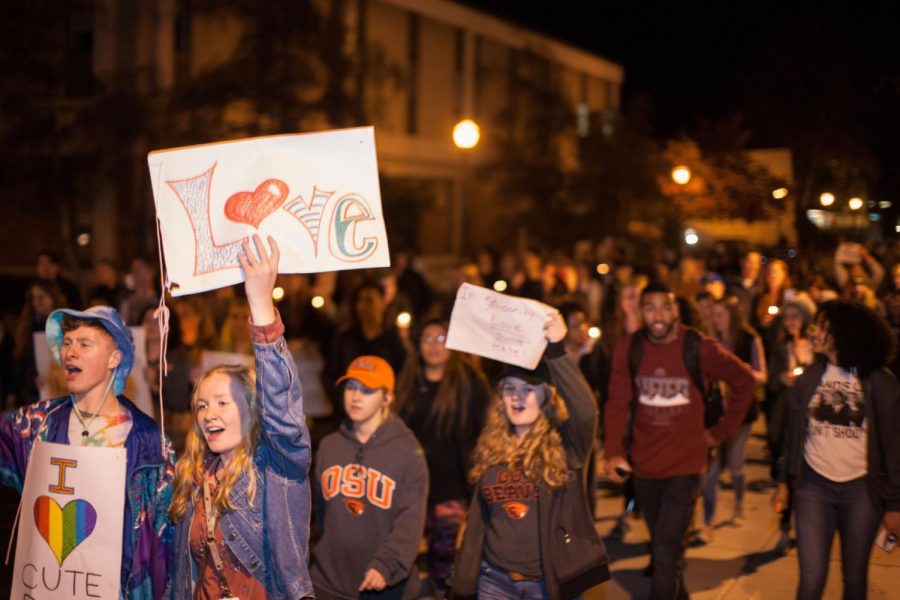Raising their voices
By Joshua Lucas Orange Media Network
Hundreds of OSU students and community members gathered the night of Nov. 9 to promote unity and community in the wake of the national election results.
November 14, 2016
Students have reacted to Donald Trump’s election by taking to the streets, organizing protests on campus encouraging unity, love
Speaking out
By Brian Rathbone
“Ain’t no power like the power of the people, ‘cus the power of the people don’t stop.”
Those words rang through the Memorial Union Quad from protesters on the day following the presidential election.
What started off as just a handful of students at 1:45 a.m., Wednesday, Nov. 9, turned into upwards of 100 Oregon State students setting up shop in the middle of the MU Quad to take part in a peaceful protest.
The group grew throughout the day as students chanted during passing time and handed out note cards to pedestrians walking by reading “Love not hate.” The night concluded with over 400 students and community members marching through the streets of Corvallis Wednesday night.
“The recent results of the election have made a lot of the people feel that their existence is not okay, and they feel very unsafe,” said Tabitha Pitzer, a junior in political science who was leading the protest. “So we are showing students of multiple identities that we are in solidarity with them and that they are safe of this campus.”
“I just wanted to let people know that their identities are recognized and they should be recognized, and just because someone says something doesn’t mean the entire country feels the same,” said Jasmin Vogel, a senior in political science and speech communications.
The protest focused on the language and rhetoric Donald Trump used throughout his campaign in regards to minorities and people with alternate identities.
“I think there were a lot of hurtful words said by our president-elect,” said DeAnna Stansky, a freshman in environmental sciences. “I think they need to be countered because it’s pretty scary when you hear that language and you are literally of any minority.”
Even though Trump won the election, protesters are not forgetting what he had said throughout his campaign, including Vogel.
“I think we need to recognize what Trump has said about people of color, women, people with disabilities, all these different identities,” Vogel said.“I just think that letting other people know that you are there for them is really important.”
Participants chanted statements like “Don’t lose hope,” “Build bridges, not walls,” and“Love, not hate.”
The protest on the quad offered a chance for healing as well as a chance to come together, including Bree Hagerman, a senior in sociology and ethnicity studies.
“It was nerve wracking, I’ve been distraught, and walking by this has made me feel a lot better,” Hagerman said. “People are ready to give you hugs, people are ready to give you signs, and everyone is out here for solidarity which I think is the most important thing right now.”
The crowd of people grew throughout Wednesday as students felt motivated to step up and support their friends, families and classmates who may be grieving from the results of the election.
“I just heard them chanting and I got curious and came out,” said Alex Sturgeon, a freshman in graphic design. “It was very admirable to see them out and willing to stand up for everything that kind of went down the drain (on election night) and it moved me to think, ‘you know what, I should be out there with them because I’m part of this community, I’m going to have to fight for it to if I want to stay here.’”
Free speech
By Richard Steeves
Freedom of speech is a value regularly expressed on college campuses. One way students can exercise this right is voting, and for many students this past election was the first time they had ever voted, let alone for president.
Following the result of the vote, students voiced their concerns through protests on campus. Although their actions may seem disruptive, they fall under acts of free speech, according to Christopher McKnight Nichols, associate professor of history and director of the Citizenship and Crisis Initiative.
“As a general principle Oregon State is a public university. It is the government and therefore there can be no restrictions on freedom of expression at Oregon State,” Nichols said. “As a general principle that’s what holds. Now there are separate kinds of spaces that have different public uses.”
This fall OSU released a Freedom of Expression document available on their website to clarify their stance on free speech. Nichols will also be moderating a panel on Freedom of Expression Nov. 17 in the Memorial Union Lounge at 4 p.m., with what he calls a “cross section” of professionals.
“We believe in free speech in the classroom and that all views, all political valences should be respected,” Nichols said. “And that’s the goal of free speech.”
Nichols has been preparing for the panel but the results of the election may change the discourse.
“The tone of this election was rancorous and so often in the gutter and full of things that were fact checked and proven to be wrong.” Nichols said. “I think that part of the response we’re seeing here is the emotional response, the affective response is all about that tone, that psychology of this moment, and I imagine that will abate somewhat as things get back to politics as usual.”
Part of the response seen on campus comes from the largely democratic voters on campus, and in Benton County and Oregon.
“My personal opinion and sort of take on campus (Nov. 9), is it reminded me what campus’ felt around 9/11,” Nichols said. “Kind of quiet contemplative sense of something historic having just happened but not really sure how to sort it out. For some it was fear, for others it was motivation to do things.”
“Virtually no pollsters and others expected this outcome,” added Nichols. “People hadn’t prepared themselves, that’s why I was comparing it to 9/11.”
Nichols hopes that both sides of the political aisle will show up to the Freedom of Discussion panel.
“We haven’t thought a lot about whether there would be protests but we would welcome that if that’s part of it. So long as we can achieve our goals of having a good discussion and town hall,” Nichols said.
“I was heartened to see a lot of students out,” added Nichols. “I would of loved to have seen even more protesting, celebrating, contemplating, talking to each other.”
As a scholar and a professor Nichols has been trying to sort out the events of the election as neutral as possible and values listening to others opinions.
“When people are learning about issues, sometimes it’s better not to speak. It’s better to listen. And I don’t mean that in a censorship sort of sense,” Nichols said.
The Freedom of Expression panel is free and open to anyone. Nichols looks forward to all opinions and political views and when speaking about both sides of an opinion or speech act, paraphrased Voltaire.
“I may hate what you say but I’ll fight to the death for your right to say it,” Nichols said.
University commitment
By Lauren Sluss
Rorie Solberg has seen her fair share of elections on the Oregon State University campus. As an associate professor of political science at OSU since 2002, Solberg witnessed incumbent George W. Bush’s win in 2004, Barack Obama’s election in 2008 and reelection in 2012.
The 2016 election, however, is unlike the rest for Solberg.
“Based upon my discussions with alumni, students, the emails we’re getting from the university itself and from discussion with colleagues, this election does seem to be different,” Solberg said. “The polling was so wrong so there’s this sense of something that was ripped away for the people who were supporting Clinton.”
To Solberg, this election also varies from the others because of the different demographics which have been inspired to take action and be heard.
“One of the most astounding things to me, trying to sit back and watch all this, is the Trump’s supporters’ outcry of, ‘We’ve been left behind, and we haven’t been heard’,” Solberg said. “This is an outcry coming from a largely white and male population.
“I completely understand it,” added Solberg. “However the connection that is not being made is that this is a cry that has been coming from people of color and women for a very long time.”
The similar feeling of disenfranchisement is not working to unify the groups, however.
“It’s dividing us instead of creating a coalition,” Solberg said. “That would be something that brings people together to try to find a way so everyone can succeed and it seems to be diving us, which is kind of sad.”
Over the past five days, Americans have been publicly voicing their opinions regarding the results of the election in the form of protests. Anti-Trump protesters have filled the streets of America’s major cities almost every night.
Colleges across the country have experienced their own forms of protests on their campuses. OSU is no exception, with over 400 students attending a peaceful rally last Wednesday.
Solberg considers students voicing their opinions, regardless of how they feel about the election, is a step in the right direction.
“I think it (protesting) shows that people want their voices to be heard, and that we have a strong First Amendment right and people are exercising it,” Solberg said. “I think it’s great, just as I think it would be great for supporters of Trump to come out and say, ‘Yay we won’.”
However, students need to be wary of what message they are portraying and what methods they use to protest, according to Solberg.
“There’s a difference between being heard and wanting to vent your frustrations. Those are two very different things,” Solberg said. “There’s a difference between wanting to talk to the other side, and wanting to tell the other side they were wrong.
“People need to figure out what they actually need, and then create the space that they need for it, because those are very different spaces,” Solberg said. “Both kinds of expression are very necessary, but you don’t want to bring one to the other space because it undercuts everything and reinforces divisions.”
Solberg recognizes the need for women to take action during the aftermath of the election, regardless of political affiliation.
“There’s more recognition that women need to stand up for themselves, and we need to call people on when they make mentions of any of the narratives that are stereotypical that continue to dog women, or belittle the ideas of, ‘Oh, it’s not that big of a deal’,” Solberg said.
“That’s our (women’s) job,” added Solberg. “It’s a hard one to stand up and say no and have our voices be heard, and really try to have folks understand what it is like.”
According to Solberg, despite varying opinions and voices coming to the forefront after the election, one thing will remain constant— OSU’s commitment to students.
“I know the university has made several statements about how they do not want the election of someone who has made blatantly sexists comments—that’s a hard truth—that that’s not going to change how we do our business on campus,” Solberg said. “I think there’s a commitment among faculty that that’s not going to change.”
Student activism
By Riley Youngman
For Drew Desilet, the ASOSU faculty adviser, student led protests and activism on campus are nothing new.
In his role, Desilet operates as the student advocate for those in ASOSU, and in doing so, supports students in their efforts to create change and bring about improvement in their lives and in those around them.
Desilet said that protest like the ones that have been organized on the OSU campus in the last week are not out of the ordinary, as elections tend to evoke more emotion and activism than most other times. For many traditional students, presidential elections are often the first time that they have the opportunity to have their voice heard and vote. This year has been no exception.
“Political campaigns, and presidential campaigns in particular will almost always garner some sort of protests on college campuses,” Desilet said.
Not only will students protest the candidates themselves, often times pressing issues from the election cycle will take the forefront. Although issues such as the use of the Electoral College in the U.S. are taking center stage in the wake of the election, those at OSU are focusing more on matters that have traditionally been direct and relevant to those on campus.
“In the most recent times, student activism on the OSU campus has been around race and racism, equity, justice and tuition,” Desilet said.
Nationally, issues around race and racism, sexual assault and sexual violence, student debt, the cost of education, curriculum, university leadership, guns and gun rights, divestment, issues pertaining to gender and sexuality, and issues relating to symbols and statues on campuses that have negative connotations are prominent on campuses.
According to Desilet, protests do not always look the same.
“A protest can take many forms,” Desilet said. “It can be silent, it can vocal, it can have signs, it can be a student lying down in the middle of the road to protest environmental issues.”
From passive movements, to walk-ins and sit-ins, to active protests, student activism does not have only one face, but changes based on how a student or group wants to get their message out, or who they are trying to deliver the message to.
Regardless of how a protest make take shape, Desilet noted that the ability to protest itself is one of the most useful tools students have.
“Both as somebody who has studied this, and as somebody who works with the university administration, I can tell you it is of the utmost importance for students to be able to speak out on campus,” Desilet said.
According to Desilet, although those in charge at universities are surrounded people that are well educated and know what they are doing, ultimately they do not have the same perspective as students.
“These people are not 18 to 22 years old, they are not working 20 to 30 hours a week for a job that may not pay all of their bills, they are not spending 15 hours a week studying in the library, staying up late writing papers,” Desilet said. “Students need to speak out so that university administrators know and are reminded what it’s like to be in the shoes of a student.”
Students protest far more than just on college campuses as well. According to Desilet, for the same reasons, these issues need to also be brought up to city councils, state legislators and in D.C.
For the last four years, Desilet has taken a group of students to D.C. to lobby Congress.
“I can see the look in the Congressman’s eyes (when the students enter), and they are engaged,” Desilet said. “When students walk into their office, their phones are down, their computers are closed, their notebook is down and they are listening to these students.”
There are several pieces of legislation that Desilet attributes student activism to for playing a large part in getting it passed, including the Violence Against Women Act, among others.
“Speaking out sometimes means putting a suit and tie on and sitting in line waiting to speak with somebody who’s time is divided out into 10 minute increments,” Desilet said.
Desilet said that although students may not always get what they want, people in power tend to listen to them. Occasionally there will be someone who will not, but this should not stop students from voicing their opinions, he said.
“If you stop speaking out those who will listen but may have not gotten the message yet, will never get that chance,” Desilet said.
College campuses have a long history of protests. From the civil rights movement to Vietnam, the 1960s and 1970s were a hotbed for activism and student protests, Desilet said. The idea of speaking out is nothing new.
In today’s world, students have the advantage of social media and technology, and Desilet said this has changed the way in which protests take shape.
“I am constantly surprised at students’ abilities to mobilize,” Desilet said. “Social media has become so intertwined in our lives that it has given us the ability to mobilize 300 to 500 people in a matter of hours. This is unprecedented compared to how things used to be.”
As an advocate, Desilet said he will never step-in to stop a protest.
“The institution has basic tenets of civility, community and care,” Desilet said. “We need to make sure we are also providing for all of those.”







